Written with Erin Stanforth, Sustainability & Resiliency Manager
If hundreds of news reports about the supply chain have done little to help you understand what those two words mean, we’re here to help! And we’ll show you why sustainability is an important piece of the puzzle.
What is a supply chain?

What it boils down to is this: when companies make or distribute goods, they contribute to the supply chain. Let’s think about a sweet potato pie (which is a supply). Every single company that brings a product to the table so that sweet potato pie can be made is a part of the supply chain. The farm that grows the sweet potatoes, the mills that use wheat to make flour, the bakery that uses that flour to make a crust. Then you have the company (or companies) that ship the ingredients and finished products to the store. Every single one of those companies, the mills and bakeries, is a part of the supply chain. Sometimes that means a dozen companies were used to bring a single product to your door. Here’s what it could look like:
Sweet potatoes, cinnamon, nutmeg, vanilla, eggs, milk, wheat
⬇️
sweet potato puree, ground cinnamon, ground nutmeg, vanilla extract, butter, flour
⬇️
Sweet potato pie filling, pie crust, aluminum pan, packaging
⬇️
Transport the pie to the grocery store
⬇️
Put it on the shelves
⬇️
Bring it home!
Take just ONE thing out of that equation and you have a break in your supply chain. Now imagine three or four breaks. Maybe there aren’t enough people to work on farms and in factories, in the mills and driving the trucks. That’s what we’re experiencing now.
Enter Sustainability
Big problem! So, how do we solve it? Sustainability. It’s a word we hear a lot but might not fully understand. The United Nations defines sustainability as meeting the needs of the present without compromising the ability of future generations to meet their own needs. So basically, we don’t want to take so much from the earth that it could never be replaced.
The companies making the things we buy must consider the content of the good (like recycled material, sustainably sourced materials or whether it can be composted). They also have to consider the working conditions of the factories and the environmental impact of getting the product where it needs to go. This is where shopping local becomes important.
So, to make sure every part of the supply chain is sustainable, people at every part of the chain have to commit to it.
Finding Sustainable Companies
Trying to figure out which companies are sustainable can be totally overwhelming! Here are some tips:
- Seek out companies that are BCorp Certified. These are businesses that meet the highest standards of verified social and environmental performance and public transparency. They also meet standards of legal accountability to balance profit and purpose.
- Research companies that are transparent in their sustainability commitments.
- When in doubt, shop local and small. By shopping local you’re reducing emissions from goods and services traveling long distances. You can also more easily ensure workers’ rights are being upheld. Plus, you’re supporting your local economy!
